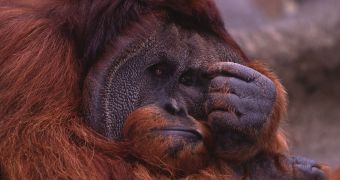A study conducted by an international research team and published in the Proceedings of the National Academy of Sciences offer a demonstration of the apes' emotional state throughout their life.
The study was initiated in an attempt to understand whether there has been a certain evolution in the human well-being paradigm, from our primate ancestors to us.
The research group composed of Psychology, Economy and Primatology specialists has concluded that the evolution of happiness in apes is similar to the one in humans: apes experience a high level of happiness when they are young, the level decreases along with maturity and it rises up again as they grow older.
The given evolutionary course subscribes to the “U-shape curve” pattern, attributed to humans in terms of happiness.
The experiment consisted of the observation of 508 great apes' behavior hosted in zoos and refugees in Canada, Japan, Australia, Singapore and U.S. For over two years, Science Daily reports.
The study revealed that the U-shaped curve is the same for male and female chimpanzees and orangutans. There was also no difference given by the distinct social status of each observed member.
“We hoped to understand a famous scientific puzzle: why does human happiness follow an approximate U-shape through life? We ended up showing that it cannot be because of mortgages, marital breakup, mobile phones, or any of the other paraphernalia of modern life. Apes also have a pronounced midlife low, and they have none of those,” declared Andrew Oswald, professor of economics at the University of Warwick, which has been a researcher in human well-being for over 20 years.
Scientists declare that the similarities between humans and apes overcome physiologic and genetic issues.
“One of the reasons we decided to look at ape data was that when you study humans, that U-shape is exactly the same when you adjust statistically for things like education, income and marriage,” Prof. Oswald explained.
Researchers believe that this study is a great new step towards the understanding of human behavior.
“This opens a whole new box in the effort to explain the midlife dip in well-being. It makes one's head spin,” said Prof. Oswald, as cited by Los Angeles Times. “This suggests that it's completely normal, and that it's apparently out of your control,” he added.

 14 DAY TRIAL //
14 DAY TRIAL //